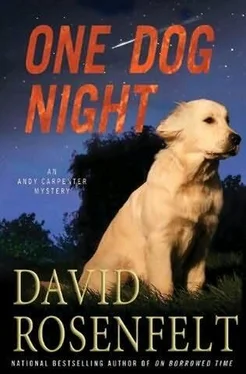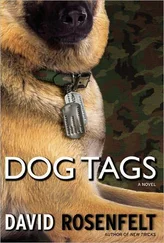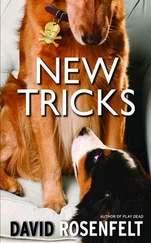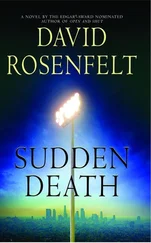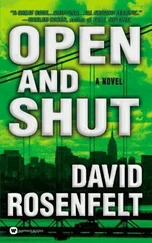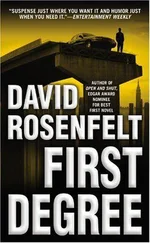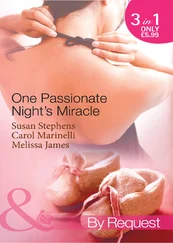
David Rosenfelt
One Dog Night
The ninth book in the Andy Carpenter series, 2011
This book is dedicated to Les Pockell. Without Les, Andy Carpenter would no longer exist. Trust me, that was the least of his many accomplishments.
When they came into the room, Noah Galloway looked at his watch.
It made no sense; he knew that as he was doing it. Noah had waited for them to arrive for six years, three months, and twenty-one days, and it was of no consequence what time of day it was when he finally saw them. Nor did he have any doubt who they were and why they were there. They might as well have been carrying a sign.
What mattered was that life as he knew it was over.
The audience giggled a little when he checked his watch; it’s not the kind of thing you do during a speech. It makes it look like you’re either bored, or anxious for it to end, or both. Noah remembered that the first President Bush got in political trouble when he did it during a debate with Clinton and Perot. But Noah was now in that kind of trouble times a thousand.
He was glad he was near the end of the speech, with only about a page and a half left. It was going to be hard to concentrate on the rest, but he’d muddle through. No sense cutting short the last speech he would ever give.
What remained of his ego also forced him to finish. While at that moment no one considered the speech in any way important, Noah knew that it would be replayed over and over on television, and would go viral within minutes. He didn’t want to seem flustered, or panicked.
He would go down with what little was left of his dignity. He owed that much to Becky and Adam.
The four men had stopped, two on the left and two on the right, on each side of the stage. They were all dressed in dark grey suits, with apparently identical blue shirts and grey ties. They looked like a semiformal bowling team, waiting to receive their championship trophy.
“The battlefield extends farther than the streets of Detroit, the harbor in Miami, and the border with Mexico. It extends around the world; drugs are a global epidemic and all of us are facing the scourge together.
“Tomorrow, as most of you know, I will have the privilege of flying to Istanbul, where I will meet with representatives of fifty-one nations. I am not going there to dictate policy, to tell anyone it’s ‘our way or the highway.’ I am going there to convey our President’s message, and I am going there to listen.”
Noah saw no reason to change the basic text of the speech; no one would care about the words anyway. He knew full well he was no longer going to Istanbul, and within minutes the world would know that his transgressions were a lot more serious than an inaccurate speech.
“Much in our modern world can be seen in both black and white; it seems as if everything comes with a ‘plus’ and ‘minus’ attached. Airplanes let us travel quickly across the planet, but the skies are much dirtier and louder for it. The Internet brings lightning-fast information, but that information is often abused and incorrect. Social networks let us connect with thousands of people, but the word ‘friend’ is devalued in the process.”
“But the abuse of drugs offers no such choice, no inherent dichotomy. There is no upside to it, no rationalization we can make. It destroys and it debases all that it touches, with nothing positive left in its wake.”
Noah paused and looked around the auditorium. He was at the same time sorry and glad that Becky was not there, that she was taking Adam to the nursery-school parents’ visiting day. It would be a horrible thing for her to witness; he could imagine the shock on her face, the outrage that would over time turn to devastation and, ultimately, acceptance.
But he knew that he would have to face her eventually, and that would be just as awful. He had let her down even before he knew her; let her down in a way that was horrible and unforgivable.
“So there are some who say we are in a war, and some who would not use that terminology. But it is certain that we are in a battle, a battle to reach our full potential as human beings. The good news is that the enemy is not hiding. He does not plant IEDs, or shoot from a covered position.
“This is an enemy we know, one which we can and will control, because the enemy is ourselves.”
The applause was polite and restrained, which was to be expected. The platitudes he’d given them were nothing they hadn’t heard for many years from many officials, and bitter experience had told everyone that actions would speak much louder than words. And over time those actions had not spoken very loudly at all.
Noah understood that, just as he understood he would not be taking any more actions, ever again.
Noah smiled, turned, and left the stage. Out of the corners of his eyes he noticed the four men rise at the same time, and move to where they would approach him. He walked to the right to meet two of them in a place that would be out of the sightline of the audience.
“Mr. Galloway, Special Agent Joseph Scarlett, Federal Bureau of Investigation.” As the man talked, he took out and showed his identification to Noah, providing visual confirmation of his words.
Noah didn’t say anything, but was conscious of the other two men coming up behind him, to prevent him from trying to escape. Their presence wasn’t necessary; Noah was not going to cause any trouble.
Agent Scarlett proceeded to tell him that he was under arrest, and he read him his rights. Noah was only half listening; he was in a bit of a daze, trying to process the fact that after all these years, his horrible secret was not a secret any longer.
Scarlett was finished speaking, and seemed surprised that Noah was not responding, not even asking why he was being arrested. “Is there a statement you would like to make, sir?”
Noah paused a moment before saying, “No.” Then, “Take me away.”
“I don’t understand tailgating,” I say, as Laurie Collins rolls her eyes.
I’m finding that people roll their eyes a lot around me these days. Since Laurie and I live and spend a great deal of time together, it happens to be her eyes that do the bulk of the rolling.
We’re on Route 3, heading toward Giants Stadium, stuck in game traffic even though the game will not actually start for four and a half hours.
“Here we go,” she says, frowning, as she addresses the empty backseat. “Ladies and gentlemen, presenting classic Andy Carpenter.”
Since she thinks I’m going to launch into one of my negative rants, I decide to surprise her and gain the upper hand by not doing so. Instead, I’m going to drop the subject.
Except I can’t.
“You mean you like tailgating?” I ask.
She nods. “I do, Andy. It’s fun, the food is usually good, and I like the people.”
I point across the highway and say, “See that place? That’s a sports bar. It also has fun, good food, and likable people. You know what else it has? It has heat.”
“Cold weather doesn’t bother me.”
“How could that be? It’s supposed to bother you. It’s bothered people for thousands of years. It’s the reason they invented indoors.”
Laurie decides not to continue the debate, and instead looks up ahead at the approaching exit and says, “We’re looking for parking lot ‘Blue 11.’”
“It will be all the way around on the opposite side of the stadium.”
“Why do you say that?” she asks.
“Because the place I’m going is always on the opposite side. That’s how they design these stadiums.”
Читать дальше
